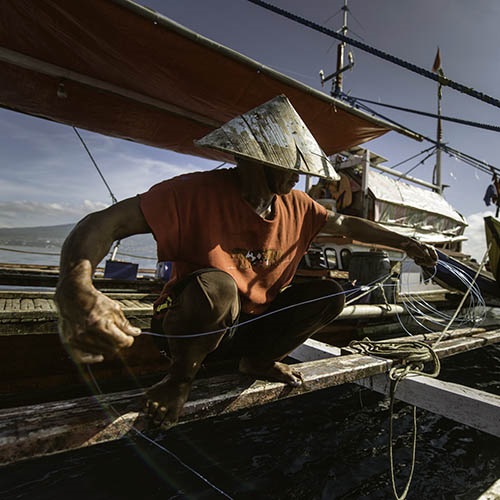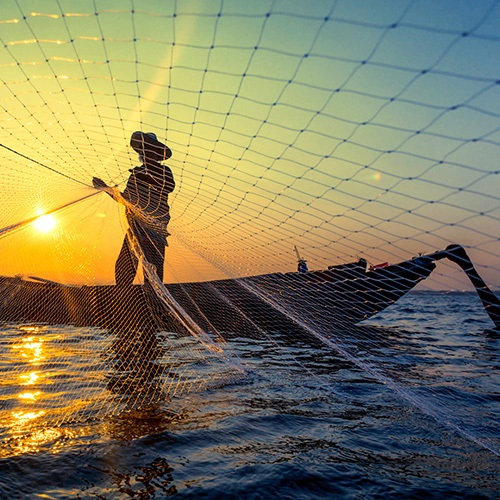Pronatura Noroeste and the West Coast Mexico Red Lobster Fishery
Amount awarded: £50,000
This project is improving the management of the northern stock of Baja California's red lobster fishery, part of a Fisheries Improvement Project (FIP) established in January 2020. The aim is for the fishery to achieve MSC certification by Dec 2024.
Around 90% of lobsters in Mexico are caught in the Baja California region, harvested by small-scale fisheries. A lack of long-term planning has resulted in over-exploitation, loss of biodiversity and increased economic stress. Illegal fishing is also a major problem in the region.
A pre-assessment against the MSC Fisheries Standard, showed the fishery would pass minimum requirements, but would likely incur several conditions of certification. Conditions are improvements that must be implemented before the end of a certification period (usually five years).
Sustainable fishery management tools
Since receiving funding the fishery project has made significant progress towards sustainability, developing a harvest strategy and harvest control rules alongside a new stock assessment developed by the National Institute of Fisheries (INAPESCA). A further review has revealed that the stock is sufficiently different from surrounding subpopulations of lobster, meaning they would be managed as a separate unit. These tools will help ensure the fishery can be well managed and catch rates adapted to the status of the stock.
The fisheries are also considering the impact on species used as bait, as well as shark interactions. Though shark bycatch is not considered a risk to populations of shark, fishers must report when sharks appear in traps and whether they are released unharmed. Data is also being compiled from other lobster fisheries around interactions of lobster traps with seabed habitats. This data will be important to understand the impact of the fishery on the wider ecosystem, which is a critical part of any MSC assessment.
Encouraging fisher stakeholder participation
The Red Lobster fishery in Baja California is one of two fisheries receiving funding in conjunction with conservation organisation Pronatura Noroeste. Pronatura Noroeste is a strategic local partner in the MSC’s Fish for Good Mexico project.
A Memorandum of Understanding (MoU) was signed in January 2020 by 12 fishers groups, three government agencies and Pronatura Noroeste. The fisheries’ progress has been verified through the In-Transition to MSC program, an eligibility criterion for the award.
The project has created training materials , including brochures, posters and three videos on effective stakeholder participation, to support engaged fisher representatives during the pandemic. The training also covers monitoring and harvest strategies and harvest control rule tools.
The fishery also received market recognition, featured as a responsible choice in the COMEPESCA sustainable seafood national campaign Pesca con Futuro. Alongside an alliance with Go Chain and local producers Litoral cooperative who have also launched a pilot project to initiate a traceability system. It is hoped this will help secure new market access for the fisheries’ products in Asia.
A small-scale Mexican lobster fishery’s path to sustainability
The Northern Mexican Pacific red rock lobster fishery faces many obstacles to achieving sustainable status. Lack of information on stock levels and poor local enforcement against illegal fishing are two key issues. But – with help from their MSC certified southern red lobster neighbour and an NGO, the fishery could be on a path to sustainability.
“Achieving sustainability for small-scale fisheries in developing countries is extremely difficult due to the limited in-the-field governance, a prevalent short-term vision for the use of natural resources and the lack of incentives. The MSC provides an incentive for various stakeholders to join and align efforts to advance towards sustainability and be recognized and rewarded for their actions.”
Pronatura Noroeste A.C.
Find out more

Our impact projects
Discover projects supported through the Ocean Stewardship Fund that are helping to grow sustainable fishing worldwide.

The Ocean Stewardship Fund
The Ocean Stewardship Fund offers grants to both MSC certified sustainable fisheries and improving fisheries.

.jpg?Status=Master&sfvrsn=82f50d4a_0)